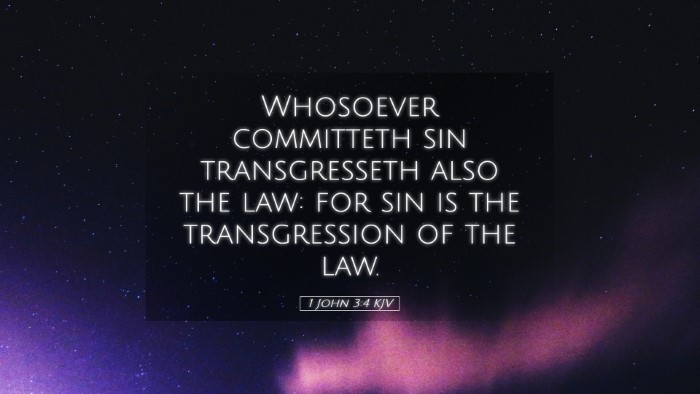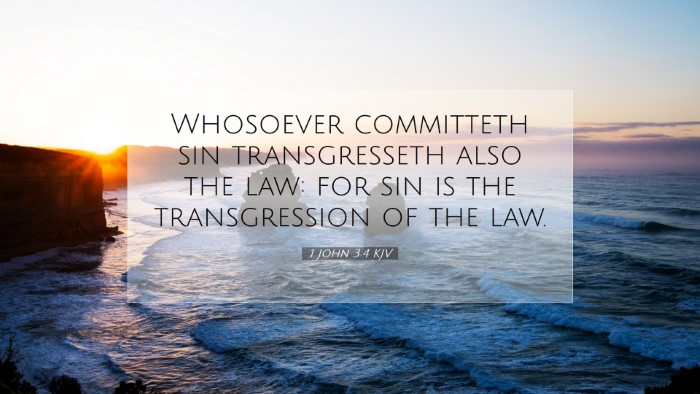Old Testament
Genesis Exodus Leviticus Numbers Deuteronomy Joshua Judges Ruth 1 Samuel 2 Samuel 1 Kings 2 Kings 1 Chronicles 2 Chronicles Ezra Nehemiah Esther Job Psalms Proverbs Ecclesiastes Song of Solomon Isaiah Jeremiah Lamentations Ezekiel Daniel Hosea Joel Amos Obadiah Jonah Micah Nahum Habakkuk Zephaniah Haggai Zechariah Malachi1 John 3:4
1 John 3:4 KJV
Whosoever committeth sin transgresseth also the law: for sin is the transgression of the law.
1 John 3:4 Bible Commentary
Commentary on 1 John 3:4
1 John 3:4 states: "Everyone who makes a practice of sinning also practices lawlessness; sin is lawlessness." This verse provides a profound understanding of sin, law, and the moral responsibility of believers. This commentary leverages insights from notable public domain commentators like Matthew Henry, Albert Barnes, and Adam Clarke to unravel the theological depth of this passage.
Understanding Sin and Lawlessness
John is clear in defining sin. Matthew Henry emphasizes that sin is not merely an act but a continuous state of lawlessness. He points out that those who engage in sin are, in effect, in rebellion against the divine law. This rebellion positions sin as a more significant transgression—an affront not only to God's commands but to His very nature.
Albert Barnes elaborates on this concept by stating that the practice of sin reflects a person's disposition and allegiance. Sin isn't an isolated act; rather, a person who sins demonstrates an ongoing state of lawlessness that separates them from the righteousness of God. Barnes stresses that knowing the law of God and violating it systematically denotes a greater issue of the heart.
The Practice of Sinning
John uses the concept of 'practice' in his statements, suggesting habitual action rather than occasional mistakes. Adam Clarke notes that while all believers may fail and sin at times, the key distinction lies in whether one's life is characterized by the habitual practice of sin. Clarke asserts that true believers are marked by their struggle against sin, not by a comfortable acceptance of it.
Implications for Believers
The implications of this definition of sin are profound for believers. This verse challenges the idea that one can live in continuous sin while remaining in a state of grace. Henry and others emphasize that there is a crucial link between faith and behavior. Genuine faith will manifest itself in obedience to God's commands, leading to a life characterized by righteousness rather than lawlessness.
The Nature of Law
By affirming that sin is lawlessness, John invites believers to consider the nature and purpose of the law. The law serves as a moral compass and reflects God's own character. Barnes states that the law of God is not just a set of rules but an expression of God's righteousness. Violation of this law implies a disregard for God's holiness.
The Relationship Between Freedom and Law
In contemporary Christianity, there is often tension surrounding the concepts of freedom and law. Some believers may view legalism as constraining, but Clarke argues that true freedom is found in adherence to God's law. Disregarding the law leads not to freedom but to a life enslaved to sin. Clarke encourages believers to see God's law as guiding principles that liberate rather than restrict.
The Contrast of Righteousness and Sin
Throughout 1 John, the contrast between righteousness and sin is a recurring theme. A commitment to righteousness entails conscious effort to resist sin. Matthew Henry emphasizes that this struggle is essential to the Christian life. Believers are called not only to avoid sin but to pursue a life reflective of Christ’s character.
The Role of Christ in Addressing Sin
This verse ultimately points to the need for Christ as the solution to the problem of sin. Barnes notes that Christ’s atoning sacrifice allows for the forgiveness of sins, enabling believers to overcome the lawlessness inherent in their nature. It is through Christ that they receive power to resist sin and live righteously. This is not to say that believers will be sinless, but they should be sinning less and growing closer to God's ideal.
Conclusion
1 John 3:4 reminds us of the serious consequences of sin while pointing us to the grace found in Christ. The notion of sin as lawlessness challenges believers to evaluate their lives and align them with the truth of God's Word.
As Henry, Barnes, and Clarke have expounded upon, the call is not merely to avoid sin but to embrace the law of God wholeheartedly. Through the empowerment of the Holy Spirit, believers are not called to merely manage sin but to walk in the newness of life offered through Jesus Christ.


